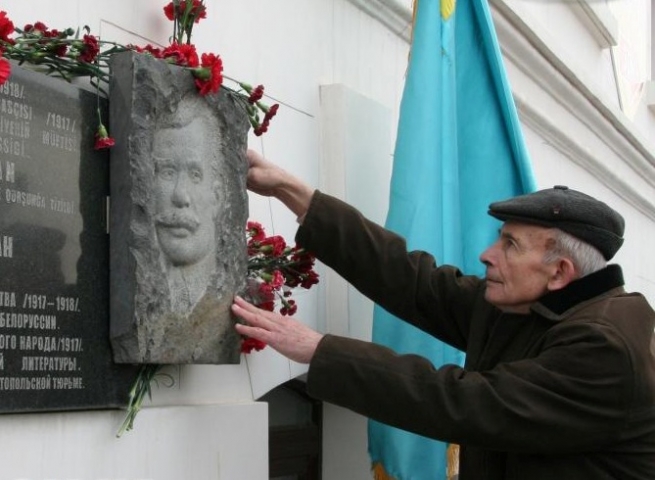February 23, the Crimean Tatar people mourns for its great son Noman Chelebicihan. This day in 1918 he was killed brutally out of court by the Red sailors in Aqyar (Sevastopil) and his body was thrown out into the sea. Leader of the 1st Qurultay of the Crımean Tatar people (National Congress) who devoted his life to the people was victim of the Bolshevik terror in Crimea.
In connection with this mournful date Noman Chelebicihan is comemorated in all the Crimean Tatar schools as well as educational institutions where Crimean Tatar is taught. Also the memory of the 1st Crimean Tatar national congress leader is honoured in Aqyar (Sevastopil) where wreath-laying ceremony will be taken place near his memorial stone near a building of the old Aqyar prison. The Crimea’s Mufti will hold public requiem service in honour of the N. Chelebicihan’s memory.
Reference: Noman Chelebicihan (1885-1918) was one of the most popular Crimean Tatar leaders of all time. He was the first President of the short-lived independent Crimean People's Republic, established on November 26 (December 9 under the Gregorian Calendar), 1917.
In January 1918, just barely two months after he was elected to lead his nation at the historic Qurultay of the Crimean Tatar people, the Bolshevik forces invaded Crimea. He was arrested and imprisoned in Sevastopol. On February 23, a firing squad of the Black Sea Fleet executed him and threw his body into the sea.
The Crimean Tatar nation continues to mourn the brutal murder of its promising young leader at the age of 33, who was a lawyer, an elected Mufti for Crimea, Poland and Lithuania and also an accomplished poet and writer.
Noman Chelebicihan was born in 1885, in the village of Buyuk Sonaq, in Chongar region of Crimea. His father's name was Ibraim Chelebi, a member of a well to do Crimean Tatar family. His mother also was from a well to do family, daughter of Cihansah Chelebi. He received his early education in his village. Afterwards, due to lack of opportunity, Chelebicihan was sent to Gulumbey Medrese, one of the well known madrassas of that time, with the help of his uncles. Later on he was sent to Istanbul to further his education.
Noman Chelebicihan arrived in Istanbul, Ottoman Empire in 1908. He attended Vefa Lisesi (High School) and later Law School. He resided in Karagumruk section of Istanbul where a small group of Crimean Tatar students lived. One of the first organizations he founded, while a student in Istanbul, was "Yas Tatar Yazclar Cyn" (Young Tatar Writers' Association). He founded this association with his friend Abibulla Temircan in 1910, and published his first literary works such as QarlgaChlar Duas (Swallows' Prayer), Altn Yarq (Golden Light) and Siirler Conku (Collection of Poems). He was one of the original founders of "Crimean Tatar Student Association" and also "Vatan" (Homeland), which became the seed for the political organization Milliy Firqa (National Party) to carry on the independent movement in Crimea during the most turbulent period in its history.
After graduating from Law School, Chelebicihan returned to Crimea to get involved in the independence movement, and was elected to represent the Or region of Crimea in the upcoming historical Crimean Tatar Kurultai. He was one of the most popular delegates because of his young age and education he received in Istanbul. Soon during the historic opening of the Qurultay on November 26, 1917, Noman Chelebicihan was elected the first president of the young Crimean Republic.
Chelebicihan was not only the first president of the independent Crimean People's Republic and Mufti of Crimea, he was also an accomplished poet and writer. In addition to his aforementioned works, his poems such as Ant Etkenmen (I've Pledged), Bastrq (Prison), Ay gidi... (Oh for...), Savlqman Qal Tatarlq! (Farewell Tatarness!), Yolcu Garip (Poor Traveler), and Tilkiden Selam (Greetings from the Fox) are his most popular poems. Ant Etkenmen became so popular that it became the lyrics of the Crimean Tatar national anthem, and according to Shevki Bektore (another popular Crimean Tatar poet), "... was sung for the first time during the historic Qurultay (1917)...." His most memorable poem, however, is Savlqman Qal Tatarlq!, which he scribbled on the walls of Simferopol train station on his way to report to military service during World War I.
By QHA



